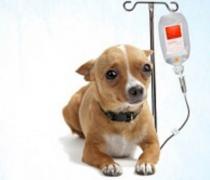Five Reasons Veterinarians Love Fluid Therapy

Five Reasons Veterinarians Love Fluid Therapy
In addition to February being National Pet Dental Health Month, we celebrate Valentine’s Day, a day about love. To expand on the theme of love, todays’ blog highlights the reasons veterinarians love fluid therapy for their patients.
Fluids Treat Dehydration
Serious cases of vomiting and diarrhea often result in dehydration. Fluid is lost in both vomit and diarrhea, plus tummy upset decreases intake. That double whammy of increased fluid loss and decreased intake can result in serious fluid deficiency. The veterinarians in the animal ER can rapidly fill your pet back up with fluids via an IV line.
Fluids Provide Electrolytes
Sodium, potassium, calcium, magnesium and chloride are electrolytes. Electrolytes are minerals in the body that carry an electric charge, hence the name “electrolyte.” These charged minerals affect the amount of water in your body, the acidity of your blood, your muscle function, and other important processes. There are many different formulations of fluids veterinarians can choose from and the exact formulation chosen depends on your pet’s electrolyte abnormality.
Fluids Deliver Medications
Most times, veterinarians use fluid therapy to provide fluid and electrolytes, but in patients unable to take oral medications or for mediations that must be constantly administered, a continuous rate infusion of fluids with additional drugs can be a lifesaver. An IV drip can be “spiked” with medications to control abnormal heart rhythms, dextrose to treat low blood sugar, antibiotics to treat infections, and even chemotherapy drugs to treat cancer.
Fluids Counteract Toxins
The kidney is a common target of toxic agents. Accidental ingestion of lilies, antifreeze, nonsteroidal anti-inflammatory drugs and grapes or raisins can cause permanent kidney damage if not treated immediately. For these kidney targeting toxins, flushing the kidneys with a large volume of fluids helps to increase blood flow to the kidneys and prevent kidney injury. Often, 48 hours of high volume fluid therapy is enough to prevent permanent kidney damage from toxins like lilies and raisins.
Fluids Promote Urine Output
Chronic kidney disease occurs commonly in the elderly cat. In chronic kidney disease, the kidneys lose the ability to filter waste products from the blood and the ability to regulate water balance in the body. Because this is a long term problem for the cat, veterinarians commonly teach cat families to administer fluids under their cat’s skin every day or so to help compensate for the poor kidney function. It is amazing to see how much better cats feel with this simple therapy.
With all these positive benefits of fluid therapy, no wonder it is a lifesaving favorite of all veterinarians.






























